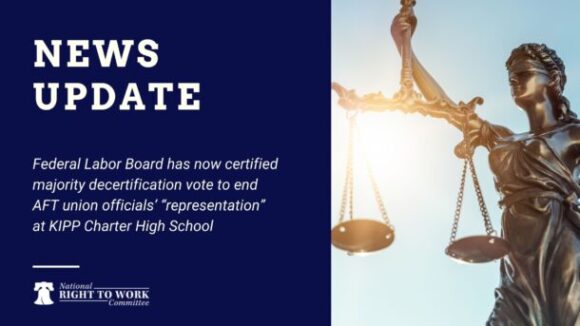Will Team Biden Weaponize Workers’ Pensions?
Big Labor abuse of worker pension and benefit funds as a means of advancing union bosses’ self-aggrandizing policy objectives is a familiar phenomenon.
The fundamental aim of Right to Work laws is to protect the freedom of the individual employee, and not either to hurt or to help union officials. But whatever they say publicly about Right to Work, union bosses know that, in exchange for losing the privilege of forcing reluctant employees to fork over union dues or fees, they start out on a better foot with employees in general.
Of course, regardless of where a unionized business is located, Big Labor may wield its monopoly-bargaining power to impose counterproductive work rules and other contract provisions that unfairly penalize talented and conscientious employees and ultimately, destroy jobs. But it is nevertheless reassuring to many employees to know that, if it turns out they personally don’t benefit from unionization, they will retain the option to refuse to join or pay dues or fees to the union.
In comments he apparently made early this year, but were first published in a July 1 Washington Post article by overtly pro-Big Labor reporter Lydia DePillis (see the link below), veteran union organizer Gary Casteel, recently promoted to secretary-treasurer of the United Auto Workers (UAW) union, explained why, from his perspective, the upside of Right to Work laws for Organized Labor is greater than the “downside” of not being able to extort money from employees who prefer not to join:
[T]here’s a school of thought that says it’s not such a great thing to have everyone pay dues whether they want to or not. Gary Casteel, [until last month] the Southern region director for the United Auto Workers, says he prefers right-to-work environments for organizing.
“This is something I’ve never understood, that people think right to work hurts unions,” Casteel said in February. “To me, it helps them. You don’t have to belong if you don’t want to. So if I go to an organizing drive, I can tell these workers, ‘If you don’t like this arrangement, you don’t have to belong.’ Versus, ‘If we get 50 percent of you, then all of you have to belong, whether you like to or not.’ I don’t even like the way that sounds. Because [Right to Work is] a voluntary system, if you don’t think the system’s earning its keep, then you don’t have to pay.”
So is it really such a terrible thing for unions to have to demonstrate their value convincingly enough for workers to want to join?


Big Labor abuse of worker pension and benefit funds as a means of advancing union bosses’ self-aggrandizing policy objectives is a familiar phenomenon.

What impact does handing a union monopoly power to deal with your employer on matters concerning your pay, benefits, and work rules have on your pay?

Federal Labor Board has now certified majority decertification vote to end AFT union officials’ “representation” at KIPP Charter High School